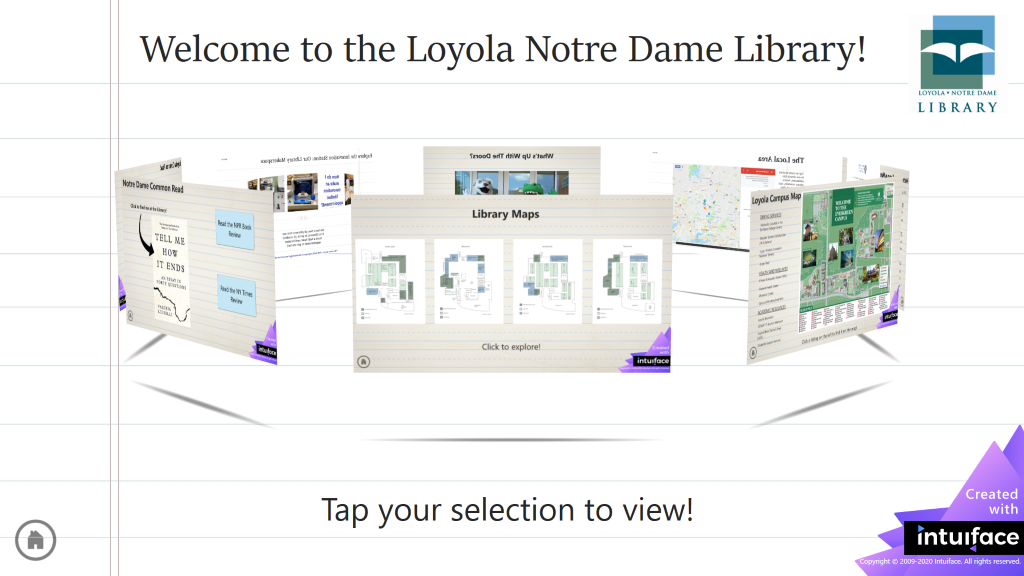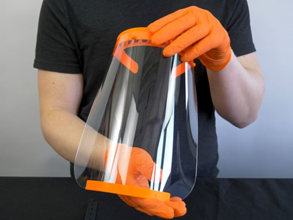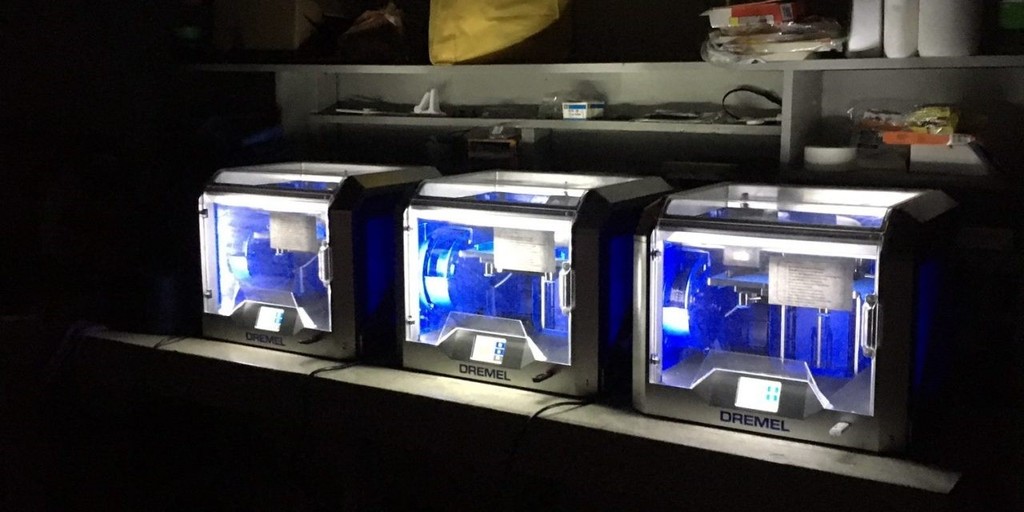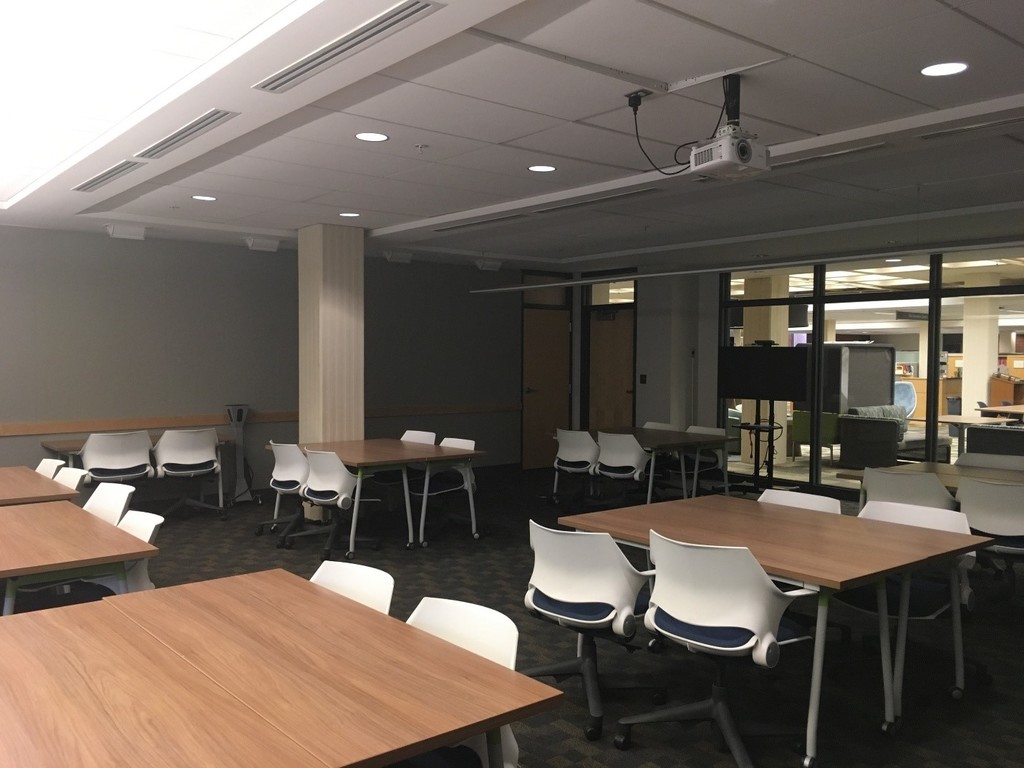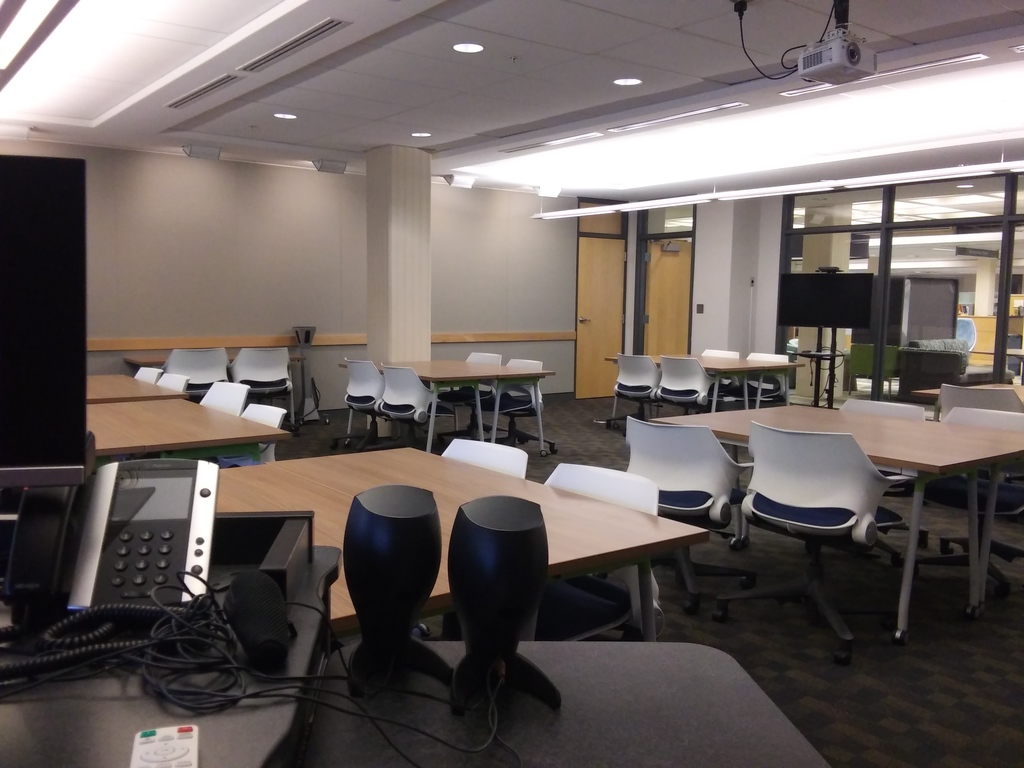Continuity of Services During COVID-19
“Thank you so much for your work during these unprecedented times. I can only say excellent things about all members of the library and how you all are helping us faculty.”
-Loyola Faculty Member
When the campuses closed during the COVID-19 crisis, the Library was prepared to rapidly respond to the remote needs of faculty and students. Library staff already provided online support via 24/7 chat, e-mail, phone, and Zoom meetings; with the closure, we shifted all instruction online and ensured that Interlibrary Loan was up and running. Because we knew faculty would need online class materials, we created a resources guide with access to over 66 newly available collections in addition to existing library eBooks, journals, and databases.
Diversity and Inclusion
To support current campus conversations about antiracism, whiteness, and police violence, LNDL identified a number of print books to purchase electronically to make them widely available to users. This is in addition to steps we’ve taken this year to diversify our collections, including adding the database LGBT Life with Full Text in April 2019. It has been used regularly over the past year, and we expect it to grow in the next academic year as well. We also provide access to streaming media focused on diversity and inclusion issues. Our two most watched videos in Kanopy were “Race – The Power of an Illusion” and “February One,” a film about the 1960 Greensboro lunch counter sit-ins. These two videos had a combined 466 views during 2019, for a total of 11,882 minutes of streaming.
Community Support
In partnership with Open Works, the Technology Librarian is printing PPE masks with the library’s 3D printers at home. In the first few critical weeks beginning in mid-March, the library’s production of 3D components accounted for approximately 2.9% of total production.
Two articles were published about the Technology Librarian’s PPE production: one in Loyola’s student newspaper The Greyhound, and one in EdTech Magazine.
Teaching, Learning, and Research
“Thank you. . .for always being willing to step up to help our students develop critical research skills.”
Michelle Gawerc, Associate Professor of Sociology, Loyola University Maryland
Assessing Student Success
LNDL continued to grow our instruction program in the areas of information literacy, technology, copyright, and the archives. In order to assess the impact that instruction has on student success, we developed a pedagogical assessment framework and mapped the learning outcomes of library instruction sessions to the Association of American Colleges and Universities Information Literacy VALUE Rubric. This illuminated the impact library instruction has on student learning across the curriculum.
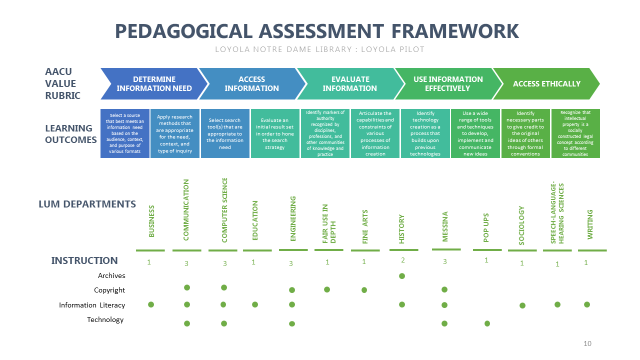
Engaging Students Where They Are
We could rapidly pivot to supporting teaching and learning remotely this semester because we already excelled at online teaching. This year, we adopted an online program that students use to practice research skills; this program was integral to shifting Loyola’s “Effective Writing” (WR100) information literacy instruction online during the COVID-19 closure. We also transformed the most frequently used instruction lab into an active learning classroom, including flexible furniture for group activities and collaborative screen-sharing technology.
Innovation
Innovation Station makerspace technology and educational technology use increased by 174% from 2018-2019 to 2019-2020, despite the building closure beginning in mid-March.
Integration with curriculum helped lead a surge in recording studio use. Bookings increased from 73 in 2018-2019 to 165 in 2019-2020.
The Virtual Reality Classroom launched in Fall 2019 with 110 individual uses. The dedicated space supported classes in religious studies, history, psychology, and nursing.
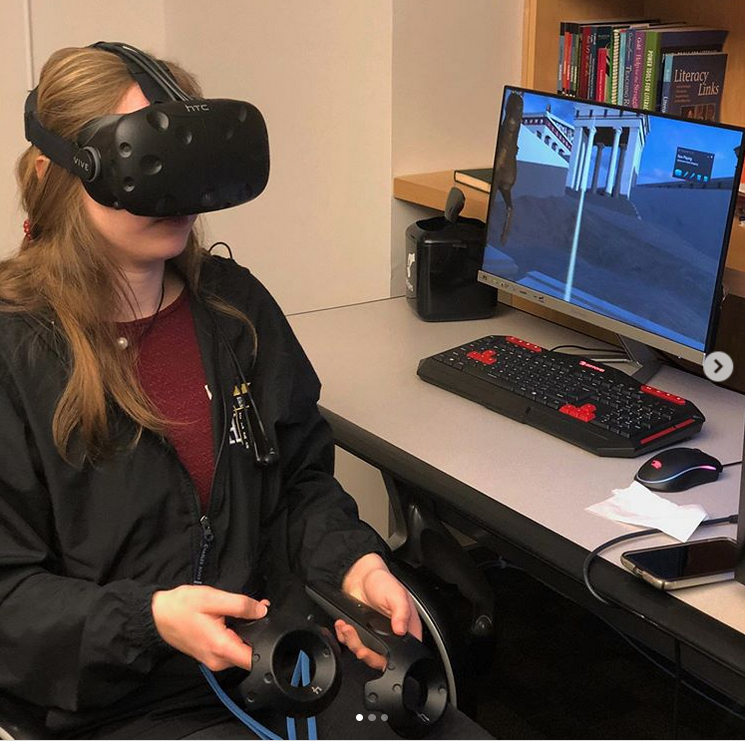
Streaming Media
Streaming media usage increased by 31% between 2018 and 2019. These digital materials are becoming more deeply integrated with both schools’ curricula, and students and faculty are incorporating it into their research. The transition to all remote instruction during the COVID-19 crisis also led to a large jump in the use of streaming media.

Cultivating Campus Partnerships
New Campus Connections
The library connected with multiple campus groups and audiences this year for the first time, including Loyola’s Messina faculty and students, new student athletes, and the staff of the Office of Undergraduate Admissions. Among other things, these groups engaged with library staff to make buttons in the Innovation Station Makerspace, tour the updated main level Digital Commons, and view campus archival materials. Additionally, we partnered with the Student Government Associations at both Loyola and Notre Dame to promote our spaces and events to the student body.
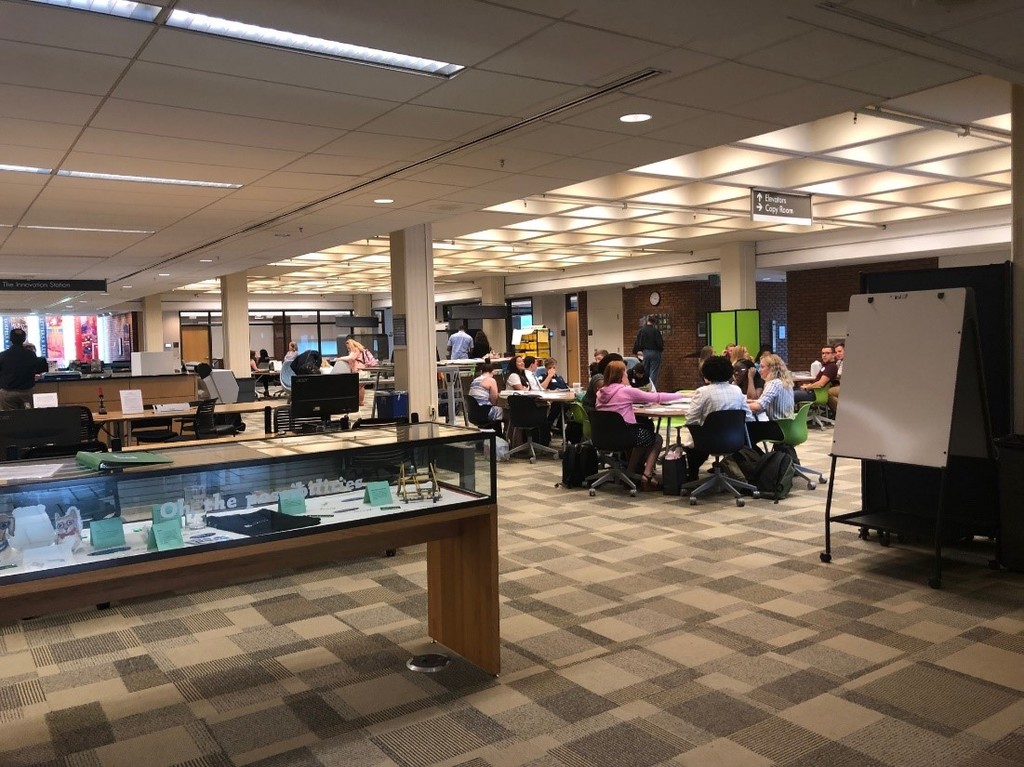
Loyola’s Robotics Club
The Library provided space for Loyola’s VEX Robotics Club to meet and work in the former DVD viewing area. The club met weekly, bringing activity into the Library every Friday afternoon.
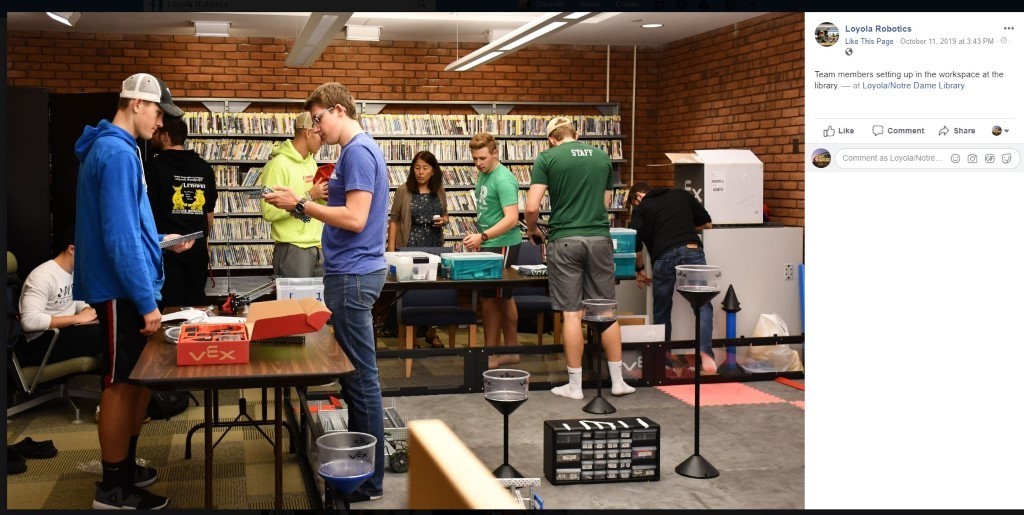
Loyola’s Center for Innovation and Entrepreneurship
LNDL hosted weekly meetings in our IDEA Space for Loyola’s Center for Innovation and Entrepreneurship Baltipreneurs, a group of campus and community members starting small businesses.
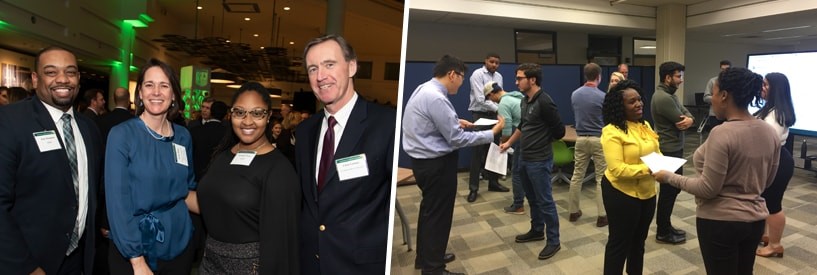
Commitment to Student Wellness
Each semester, the library provides multiple opportunities for students to take a break and relax during finals, and we continued that virtually this year. Students participated in a streaming yoga class with a Loyola FAC instructor, a Zoom bingo game, and a “May Madness: Battle of the Books” online competition.
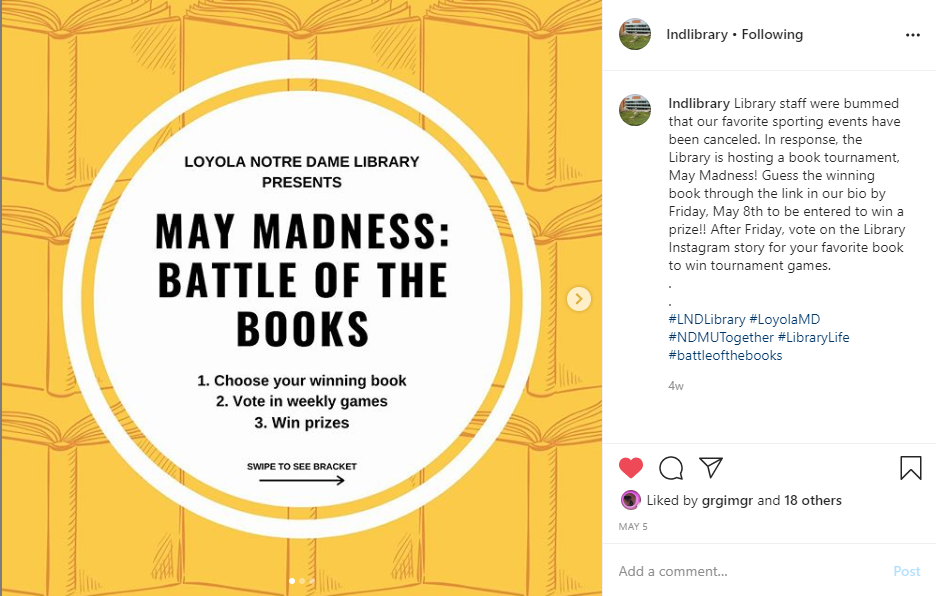
Collection Services
Digital Book Displays
The Library employed new technologies to engage users with our collections. We created interactive digital book displays on our new Visualization Wall and Collaboration Stations, which are mobile touchscreen displays that people can easily project to from their devices. Four book displays were made throughout the year. During Welcome Week in August 2019, the display highlighted resources useful for incoming and returning students. Digital displays were also created to highlight materials in our collection related to Black History Month, Banned Books Week, and Women’s History Month.
